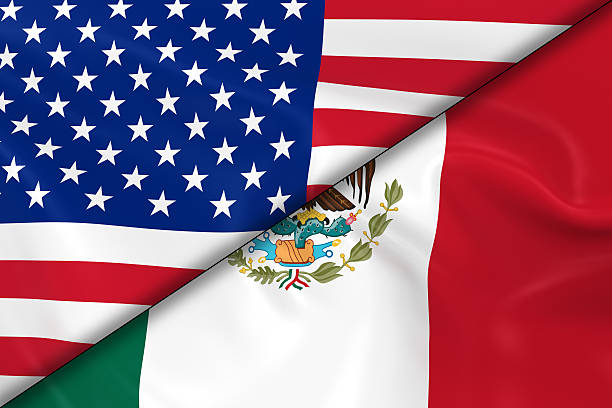According to updated U.S. regulation, meat, egg and poultry products with the voluntary "product of USA" label will need to be derived from animals raised and processed entirely in the United States.
At first glance it seems rather innocuous — the United States has finalized a new “Product of USA” rule for the labeling of meat, poultry and egg products.
But Mexico isn’t at all happy, and has warned it could challenge the rule under the United States-Mexico-Canada Agreement (USMCA) or at the World Trade Organization (WTO).
The United States Department of Agriculture (USDA) noted in a statement on Monday that Secretary of Agriculture Tom Vilsack had announced “the finalization of a rule to align the voluntary ‘Product of USA’ label claim with consumer understanding of what the claim means.”
The department said that “USDA’s final ‘Product of USA’ rule allows the voluntary ‘Product of USA’ or ‘Made in the USA’ label claim to be used on meat, poultry and egg products only when they are derived from animals born, raised, slaughtered and processed in the United States.”
The Canadian Press reported that the final rule “is a sharp change from current [U.S.] policy, which allows voluntary use of … [‘Product of USA’] labels on products from animals that have been imported from a foreign country and slaughtered in the U.S., as well as on meat that’s been imported and repackaged or further processed.”
The USDA said that “the rule will prohibit misleading U.S. origin labeling in the [U.S.] market, and help ensure that the information that consumers receive about where their food comes from is truthful.”
The department noted that the new rule “is supported by petitions, thousands of comments from stakeholders, and data from a nationwide consumer survey.”
For its part, the Mexican Economy Ministry says the rule violates “the principles of economic integration” on which the USMCA free trade pact is based. Canada is also unhappy.
The Mexican government clearly believes that sales of Mexican meat in the U.S. — and exports of such products — will decline as a result of the implementation of the final rule, and consequently is steadfastly opposed to it.
The Ministry of Agriculture and Rural Development (SADER) fired the first shot in Mexico’s firm response to Vilsack’s announcement.
In a statement on Monday, SADER said it was “disappointed and concerned” about the announcement on the final rule on voluntary “Product of USA” labeling.
“This measure does not take into consideration the deep integration of the livestock and meat industries of North America,” the ministry said, adding that it and Mexico’s main agricultural trade associations had asked the USDA to “reconsider the rule and allow consultations between both countries.”
SADER said it had wanted to “jointly revise alternatives and mechanisms that acknowledge the dynamism and complexity of the trade integration of the industry, and avoid distorting regional supply chains via unnecessary trade barriers.”
The ministry also highlighted that Mexican cattle and beef exports to the U.S. were worth almost US $3 billion last year, and noted that “Mexico continues to be one of the [United States’] main suppliers of beef and beef products”
“… The final rule on voluntary ‘Product of USA’ claim is a setback, allowing inconsistencies with the U.S. obligations to the World Trade Organization (WTO) to fulfill the final determination of the mandatory country of origin labeling (mCOOL) dispute, and Mexico reserves the rights accordingly,” SADER said, adding that it is ready to collaborate with other Mexican ministries “to defend the interests of Mexico’s agricultural and livestock sectors.”
The SE followed up with a statement of its own on Thursday, saying that it “rejects” the USDA’s announcement on the final labeling rule.
“The restriction on the use of the label “Product of USA” to products derived from animals born, raised, slaughtered and processed exclusively in the United States is discriminatory to Mexican products and could create barriers in binational production chains,” the ministry said.
The SE said that the measure “threatens to generate disruptive effects on food [supply] chains as well as logistical complications and additional costs” that Mexican producers and “especially United States consumers” will end up paying.
In addition to saying that the new rule contravenes the principles that underpin the USMCA, the ministry said that it is “counterproductive” at a time when production chains between the three nations of North America “have intensified like never before.”
“The Economy Ministry urges United States authorities to reconsider this rule and intensify dialogue with their Mexican counterparts to avoid negative repercussions on bilateral trade,” the statement said.
The SE said that Mexico — the United States top trade partner last year — has a “firm commitment to constructive dialogue as the preferred way to resolve differences with its largest trade partner.”
“However, in the interests of protecting the rights of our producers and maintaining trade flows that are fair and free of discrimination, [the federal government] is carefully analyzing the possibility of using mechanisms available both in the USMCA and in the WTO with the objective of ensuring that the United States complies with its commitments regarding technical barriers to trade,” the ministry said.
A formal dispute could add to lingering tensions between Mexico and the United States, as the two countries are already engaged in long-running feuds over the Mexican government’s nationalistic energy policies and its plan to phase out all genetically modified corn imports.
Source: Mexico News Daily














